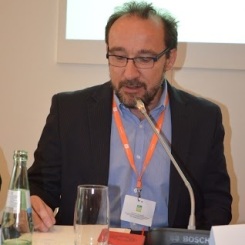By David Andersson | IDN-InDepth NewsViewpoint
This is the text of a presentation at a workshop – ‘Turning a Crisis into an Opportunity: Humanizing the Economy’ – organised on June 18 by IDN partner Pressenza International Press Agency at the Deutsche Welle Global Media Forum 2013 in Bonn. It is being reproduced by arrangement with Pressenza.
Gift economies could be very potent and effective organizing tools for creating value. We have many examples of gift economies in our world today, such as community gardens or free/open software, where no money is paid for the creation and maintenance of this resource but instead people contribute time and talent and get recognition and respect as well as shared access to the resources.
Other examples include the Time Dollar community, where people give their time in exchange for services or goods, and the donation system (such as blood donations). It sometimes confounds economists who think that rational self-interest in a cash economy is the only way to create value, but it is clear to see in the internet that sharing is happening all the time: Wikipedia, social networking communities, collaborative websites and archives like the Internet Archive website, the blogosphere community, and of course the Linux operating system with tens of millions of volunteers around the world who add to its design without the apparatus of the corporate world. Linux is ported to more computer hardware platforms than any other operating system.
The creative world also has developed a Common License mechanism removing money exchange and opening accessibility for music, photos, videos, software, and scientific and educational materials under the Creative Common License. The Creative Commons organization has the following goal: “Our vision is nothing less than realizing the full potential of the Internet — universal access to research and education, full participation in culture — to drive a new era of development, growth, and productivity.” It has grown from under 1 million works in its the first year to over 400 million at the end of 2010.
GlaxoSmithKline (GSK), for example, is a major pharmaceutical company that has surrendered all copyrights in its malarial data set, which includes more than 13,500 compounds known to be active against malaria:
By making this information publicly available, GSK hopes that many other scientists will review this information and analyse the data faster than we could on our own. Hopefully, this will lead to additional research that could help drive the discovery of new medicines. We would also encourage other groups, including academics and pharmaceutical companies, to make their own compounds and related information publicly available.
This is essentially an example of ‘open source’ being applied to drug discovery. We know that data increases in value when connected with other data and that the more eyes looking at a problem, the more potential solutions may arise.
The interesting part of gift economies is that it releases energy, ideas and commitments that the market economy, with its legal contracts and focus on accumulation of money, often can’t. Giving economies have a sense of mutual commitment and trust, they promote openness, the sharing of information, and are socially very satisfying and build community. The challenge is to recognize that we have such systems already and should give them respect as coherent value-generating systems.
It’s worth recalling the bold vision of James Quilligan – an analyst and administrator in the field of international development since 1975 – for re-inventing nation-states and international relations through commons-based governance: “The solution does not rest with the sovereign club of nations or with the club of the world’s elite banks and corporations. It rests with the people and our ability to create political accountability for the management and production of our commons. It involves our ability to create the new structures that will support sustainability and sharing.”
Quilligan has also collaborated with several United Nations agencies as well as international development organizations on global commons issues and has served as an economic consultant for government agencies in 26 nations. Quilligan is presently Managing Director of the Center for Global Negotiations and Chairman of Global Commons Trust.
*David Andersson is currently the Director of the New York City chapter of the Humanist Party (HP), member of ‘Making Worlds: a Commons Coalition’, a collaborative effort by Occupy Wall Street to explore the utility of the commons in creating a better world and the coordinator of the New York Coalition to Expand Voting Rights (Ivote NYC), Before forming the HP in 2009, David Andersson was the Director of Special Campaigns at the Center of Cultures for more than 10 years and co-founded the Diversity Center of Queens in Jackson Heights. [IDN-InDepthNews – June 26, 2013]
Image: David Andersson | Credit: Pressenza IPA
2013 IDN-InDepthNews | Analysis That Matters
Send your comment | Subscribe to IDN newsletter
Follow us on Twitter and Facebook:
http://twitter.com/InDepthNews
http://www.facebook.com/IDN.GoingDeeper

